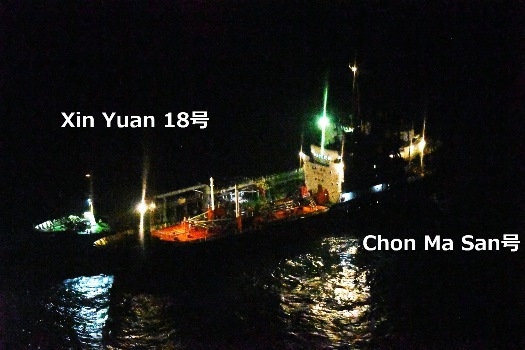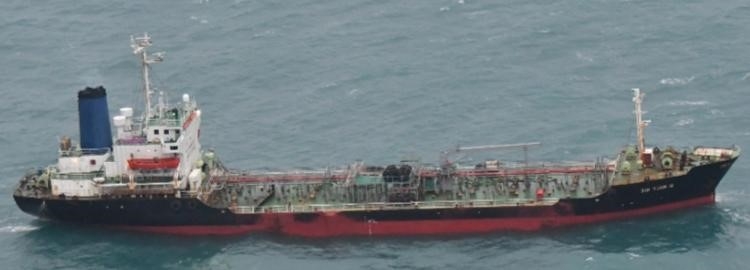Photos: North Korean Ship-to-Ship Fuel Transfer
Japan's foreign ministry has released evidence of another suspected ship-to-ship transfer involving a North Korean product tanker. High seas petroleum transfers to North Korean vessels are prohibited under U.N. Security Council economic sanctions on Pyongyang's nuclear program.
At midnight on Saturday, a Japanese P-3C patrol aircraft found the North Korean product tanker Chon Ma San alongside the Maldivian-flagged product tanker Xin Yuan 18. The vessels were located in a known area for sanctions-busting activity about 135 nm off Shanghai.


The day before the alleged transfer, the U.S. Treasury designated the Chon Ma San as a blacklisted vessel for suspected violations of U.N. Security Council sanctions. Photos taken by the Japanese patrol aircraft show that her crew has painted over her identification markings to obscure her identity (top).
The 1982-built Xin Yuan 18 was bought by Ha Fa Trade International of Hong Kong in November, then reflagged and renamed. She has been managed by Long Line International Ship of Hong Kong since mid-January. Her last reported AIS position was off Kaohsiung on February 8.
Long Line's only other ship, the 1995-built Prospery [sic], was purchased and renamed last month. At the time of her last received AIS signal she was off Kaohsiung, bound for sea.
Coast Guard could deploy for boardings

that matters most
Get the latest maritime news delivered to your inbox daily.
The latest Japanese intercept of a high-seas fuel transfer comes as U.S. officials say that they are working on a plan for intercepting North Korean shipping. The proposed operation - first reported by Reuters - could involve the deployment of U.S. Coast Guard assets to perform vessel board, search and seizure (VBSS) duty. It could include boardings within the 12 nm limit of allies' territorial seas, an action allowable under the current sanctions regime, or in international waters, which could be construed as an act of war.
The Trump administration has been calling for U.N. permission to conduct high-seas boardings and discussing the idea with America's allies for months. China and Russia, which have permanent seats on the U.N. Security Council, both object to the plan and could veto a U.S. proposal. According to Reuters' report, the administration is now considering vessel interceptions without further diplomatic cover, and defense planners are already drafting rules of engagement.
